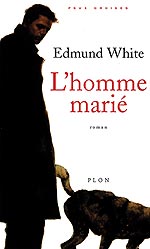|

Edmund White
© Sabine Mille |
|
Book Interview
Interview courtesy of Alfred A. Knopf, New York

Edmund White has long been considered one of America’s finest
writers as well as its leading gay novelist. After 16 years in
Paris, he moved back to New York last fall. Here he talks about
his new novel, “The Married Man.”
Q: While “The Married Man” shifts from France and Venice to Providence,
Key West and Morocco, it primarily takes place in Paris. What
is it about Paris that fascinates you in life and in fiction?
EW: Initially I just went to Paris for a year, and on arrival I
met an expatriate woman who told me, “I, too, thought I'd stay
just a year — and now it’s been 20.” I'd gone when I was 43 and
at that time in one’s life one can either settle in and keep doing
the same things, or one can change everything radically. I loved
giving up teaching and becoming a student, learning a new language
(though it was often frustrating), reading a whole new contemporary
literature — and especially discovering values and attitudes that
challenged American views. I like Henry James’ "international
theme," which still strikes me as fertile material. Now I don't
feel either all-American or all-French — and that outsider status
is useful to a novelist, especially a novelist of manners.
Q: Now that you live in the States again, are there things about
life in France that you miss? Conversely, have you gained any
newfound appreciations for American culture?
EW: I never disliked America nor left it for political reasons,
or as a protest of any sort. I did gain an appreciation of France
and the French (who are the most loyal friends, and in fact practice
a cult of friendship). I’m appalled by the routine anti-French
sentiments expressed in America, especially stories of Parisian
rudeness which are just part of urban folklore, impervious to
experience. It’s a form of racism, really. I miss French food,
the rapidity and lightness of French conversation, French discretion,
the rigor of French intellectual style, the shrugging French sophistication
about sexual peccadilloes.
Q: Early in your new novel, the main character, Austin, throws
a dinner party for all his young French friends, who are mostly
gay men and straight women. Do you see these two groups as a happy
alliance of sensibility?
EW: Both groups are focused on men, so there’s a natural point of
alliance, and both know what it’s like to be second-rate citizens.
And both are well-versed in the arts of seduction. Both have been
sex objects (if they’re lucky) and fear the end of personal attractiveness.
Both have had to come up against that big immovable object – the
male ego.
Q: While “The Married Man” is an often funny love story, it’s also
quite heart-wrenchingly sad when AIDS enters the picture. You've
seen many friends and lovers die and you've lived with an HIV-positive
status for 15 years. Was it difficult for you to write about this?
EW: I had no choice. I lived through such painful experiences with
my real French lover who, like the character in my book, died
in Morocco. I was so haunted by those memories — and simultaneously
so afraid of forgetting a single detail through the natural amnesia
of grief and time — that I felt driven to get it all down. But
yes, it was painful — far more painful than cathartic.
Q: Do you think of other gay men as the primary audience for your
book?
EW: Not at all, AIDS is something that has affected virtually everyone,
and the conclusion of the book, I hope, is a realistic, unsentimental
look at how people live through — and sometimes die from — the
disease.
More important, I decided to downplay the explicit sexuality of
my earlier books in order to open this one up to the general reader.
Many of the characters are themselves heterosexual; the basic
situations are easy for anyone to identify with; and there’'s
a lot of humor and irony and cross-cultural satire designed to
appeal to any educated reader.
Q: In the novel, Julien is married but separated — bisexual, but
ardent in his devotion to Austin. And yet the conflict of interest
doesn't appear to bother Austin as much as he finds it mysteriously
intriguing.Why?
EW: Maybe that French discretion and sexual sophistication I mentioned
earlier rubbed off on my expatriate, Austin. I think that older
gay men are rejected by the ordinary gay community, if not as
friends at least as partners, so older men (like Austin, or me)
learn to look for love in strange places, and not demand that
things be ideal.
Edmund White will be reading from “L’Homme marié” (Plon), the
French edition of “The Married Man” (Knopf/Chatto) on September
7; see notenook for details
|
|









